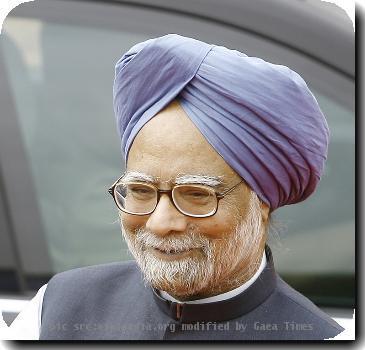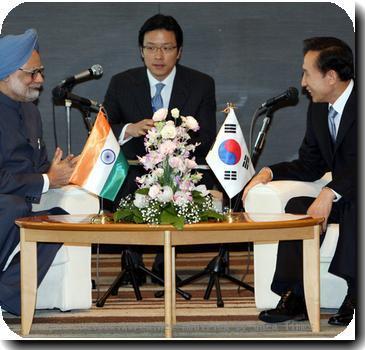India, Pakistan quarrel after talks, but say dialogue will continue (Intro Roundup)
By IANSFriday, July 16, 2010
NEW DELHI/ISLAMABAD - India and Pakistan were at their antagonistic best Friday, a day after the first meeting of their foreign ministers in nearly two years ended in public discord. However, both sides maintained that the talks had made progress and there was “no breakdown” in their engagement which they said will continue.
Pakistan launched a tirade against India’s “selective focus on terror” while New Delhi reminded Islamabad that cross-border terror remained the biggest obstacle in normalising strained ties in the subcontinent.
Their recriminatory rhetoric comes exactly a year after the landmark Sharm-el-Sheikh joint statement after talks between Prime Minister Manmohan Singh and his Pakistani counterpart Syed Yusuf Raza Gilani in the Egyptian resort that led to accusations of a “sellout” by critics in India.
India’s alleged involvement in the unrest in Pakistan’s largest province of Balochistan found its way into the joint statement that also for the first time did not link the suspended bilateral dialogue with Pakistan’s action against anti-India terrorists.
Returning from Islamabad, Indian External Affairs Minister S.M. Krishna said the talks with his Pakistani counterpart Shah Mehmood Qureshi Thursday enabled both sides to have “a better understanding of each other’s positions on all issues of mutual concern.”
“We have made some headway,” Krishna told reporters here in a bid to conjure up a hopeful note despite an overwhelmingly negative impression that the talks between the two countries Thursday ended in deadlock and bad feelings. “I have invited Qureshi to visit India. I am looking forward to resuming the dialogue from where we left it yesterday.”
India wanted these talks to be gradual and incremental to ease the “trust deficit”, he said after returning from a three-day visit to Islamabad for the first major talks since the 26/11 attacks in Mumbai.
Krishna, whose joint press conference with Qureshi had ended in discord in Islamabad Thursday, said he had told the leadership of Pakistan that it would have to take action against the perpetrators of the November 2008 Mumbai attack and unravel the larger conspiracy against 26/11 that plunged bilateral ties to a new low.
Terror, Krishna stressed, remained the biggest obstacle in normalising relations with Pakistan. “Unless this is met, everything else will be futile,” Krishna told reporters at Delhi airport.
Government sources said in New Delhi the two sides have decided to continue their engagement and discuss all issues. There is, however, no clarity on what form this engagement would take except for a meeting between Krishna and Qureshi later this year.
Foreign Secretary Nirupama Rao told CNN IBN channel that “the talks have not collapsed. The talks must move forward.”
Krishna returned to Delhi to negative political reaction with the chief opposition Bharatiya Janata Party (BJP) asking the government to call of the dialogue that was resumed at India’s instance with preparatory meetings between the two foreign secretaries followed by that of the home ministers.
There was anger and outrage at Qureshi’s remarks at a televised press conference with Pakistani journalists he addressed barely minutes before Krishna left for New Delhi.
Qureshi took potshots at Krishna and launched a broadside against India’s what he called “selective focus on terror.
“If we focus on just one issue (terrorism), it will be difficult for Pakistan to move forward,” Qureshi said, while accusing India of being obsessed with terrorism and excluding other bilateral issues.
“We understand India’s concerns and want to address them. But Pakistan also has its concerns and core issues which should be understood by India,” added Qureshi.
He even said the “Indian foreign minister received foreign policy directions from New Delhi repeatedly during our meeting.”
“India should call off the dialogue,” fumed Sushma Swaraj, BJP leader and Leader of Opposition in Lok Sabha. “By going to town, Qureshi broke all protocol. He broke all protocol,” The BJP also targeted Qureshi for remarks Thursday night that seemed to equate Hafiz Saeed, the suspected mastermind of 26/11 attacks, and Home Secretary G.K. Pillai and said Qureshi did not deserve to be the foreign minister of Pakistan.
The Congress, too, termed as “uncalled for, unjustified and condemnable” Qureshi’s remarks that Krishna did not have the mandate for talks, and said India did not need a “certificate” from Qureshi on the issue.
Pitching for “serious, comprehensive and sustained dialogue,” Krishna said he didn’t want to score debating points over Qureshi.
There is “absolutely no comparison” between Pillai and Lashkar-e-Taiba (LeT) chief Hafiz Saeed, Krishna said.”Where is the question of comparison between the two statements. He is a person who has been speaking out of turn against India. He has been crying for jihad against India,” said Krishna.
“Pillai is supposed to have made a statement to a particular newspaper,” the minister said, adding that the home secretary’s allegations on the ISI being involved in the 26/11 Mumbai strike was a result of the access Indian officials had to US terror suspect David Coleman Headley.
Krishna rejected remarks by Qureshi that he was in touch with New Delhi during the talks in Islamabad, saying that he was “totally cut off from India”.
“I did not speak with anybody, mandate given to me was very precise and I did not need any other instruction from New Delhi,” he said.
Terror remains India’s core concern and this has been conveyed, sources said.
Krishna stressed that Pakistan has assured India in the talks on acting “with full force against 26/11 terrorists” and to fulfil the pledge not to allow the Pakistani territory to be used for terror against India. Krishna, however, clarified that India did not insist on any timeline for bringing the 26/11 to justice as it is not practical or feasible.

